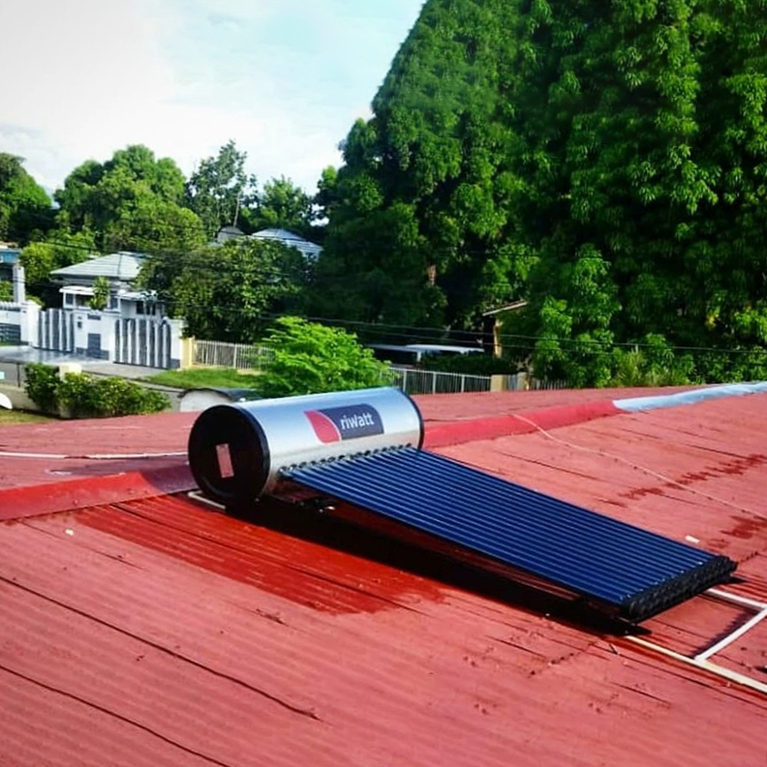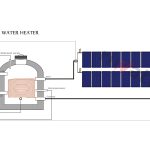Water is used in a number of home appliances including dishwashers and sinks. Water does not
come into your home hot. It must be warmed by a water heater. A number of water heaters can
be used with the most popular being solar and gas water heaters. Both have advantages and
disadvantages. A homeowner should consider her particular needs when deciding on which one
to install.
Solar Water Heater
Solar water heaters are water heaters that utilize solar power. The two main types of solar power
water heaters are known as direct and indirect solar power water heaters. Direct heaters have
circulating pumps and controls, while indirect do not. Both types include storage tanks and solar
collectors, the most important parts of the heater system.
Gas Water Heater
A second type of water heater is the demand water heater. These types use either electricity or
gas to heat the water. Incoming cold water is heated by the gas burner and then expelled at a
rate of 2 to 5 gallons per minute depending on the quality and size of the machine and pipes.
Advantages of Solar Water Heaters
An advantage in having a solar power water heater is that solar power heaters can be installed in
nearly any place where sunlight is found. Sometimes a home may be in so remote a location that
a gas supply or a company to install a gas water heater will not be available. A second benefit is
that solar water heaters are environmentally friendly. Solar power is very clean and does not
release carbon compounds like other power systems. Also, solar power does not require drawing
power off of a power grid, which is likely created by burning fossil fuels.
Disadvantages of Solar Water Heaters
Unfortunately, solar water heaters are not perfect. Solar power itself has limitations. Some areas
at high latitudes will not be able to use it efficiently because the winter months do not provide
sufficient sunlight. Also, the startup costs for solar water heaters are very expensive. Solar power
itself still remains a very expensive technology. However, the initial startup costs can be
overcome within 15 to 30 years. A third disadvantage of solar water heaters is the fact that they
have a storage tank. Because water is idle in storage tanks, a great amount of heat is lost over
time.
Advantages of Gas Water Heaters
Gas water heaters do not require a storage tank like most solar water heaters. Thus, the heat of
the water will last much longer and you will not have to spend money to reheat the water. A
second advantage is that gas water heaters can be used at all times of the day. During cloudydays and dark nights, gas water heaters continue to work, unlike solar water heaters.
Disadvantages of Gas Water Heaters
Just like solar water heaters, gas water heaters also have limitations. For one, you cannot expel
hot water from two different sources. This means that you will not have hot water if you run your
washing machine when trying to take a shower. Second, gas water heaters are not
environmentally friendly, relying on combustion to operate. Combustion releases carbon dioxide
into the atmosphere contributing to the greenhouse effect.
Benefits of Solar Water Heater
There are many benefits to owning a solar water heater and number one is economics. Solar
water heater economics compare quite favorably with those of electric water heaters, while the
economics aren’t quite so attractive when compared with those of gas water heaters. Heating
water with the sun also means long-term benefits, such as being cushioned from future fuel
shortages, price increases and environmental benefits.
Economic Benefits
Many home builders choose electric water heaters because they are easy to install and relatively
inexpensive to purchase. However, research shows that an average household with an electric
water heater spends about 25% of its home energy costs on heating water.
It makes economic sense to think beyond the initial purchase price and consider lifetime energy
costs, or how much you will spend on energy to use the appliance over its lifetime. It found that
solar water heaters offered the largest potential savings compared to electric heating, with solar
water-heater owners saving as much as 50% to 85% annually on their utility bills over the cost of
electric water heating.
However, at the current low prices of natural gas, solar water heaters cannot compete with
natural gas water heaters in most parts of the country except in new home construction.
Although you will still save energy costs with a solar water heater because you won’t be buying
natural gas, it won’t be economical.
Paybacks vary widely, but you can expect a simple payback of 3 to 8 years on a well-designed
and properly installed solar water heater. (Simple payback is the length of time required to
recover your investment through reduced or avoided energy costs.) You can expect shorter
paybacks in areas with higher energy costs. After the payback period, you accrue the savings
over the life of the system, which ranges from 15 to 40 years, depending on the system and how
well it is maintained.
You can determine the simple payback of a solar water heater by first determining the net cost of
the system. Net costs include the total installed cost less any tax incentives or utility rebates.
After you calculate the net cost of the system, calculate the annual fuel savings and divide thenet investment by this number to determine the simple payback.
Tax Incentives and Rebates
Many countries in the world offer subsidies on domestic as well as commercial solar water
heating system installations. Such as Government of India ,South Africa offers 100%
depreciation claim in the first year itself on installation of commercial solar water heating
systems.
Long-Term Benefits
Solar water heaters offer long-term benefits that go beyond simple economics. In addition to
having free hot water after the system has paid for itself in reduced utility bills, you and your
family will be cushioned from future fuel shortages and price increases. You will also be doing
your part to reduce this country’s dependence on foreign oil. The National Remodelers
Association reports that adding a solar water heater to an existing home raises the resale value
of the home by the entire cost of the system. You may be able to recoup your entire investment
when you sell your home.
Environmental Benefits
Solar water heaters do not pollute. By investing in one, you will be avoiding carbon dioxide,
nitrogen oxides, sulphur dioxide, and the other air pollution and wastes created when your utility
generates power or you burn fuel to heat your household water. When a solar water heater
replaces an electric water heater, the electricity displaced over 20 years represents more than 50
tons of avoided carbon dioxide emissions alone. Carbon dioxide traps heat in the upper
atmosphere, thus contributing to the “greenhouse effect.”
ANY PENDING QUERIES, PLEASE FEEL FREE TO CONTACT US:
Mobile: +86 180 0660 1051
Inquiry E-Mail: info@riwatt.com
Web:www.riwatt.com




